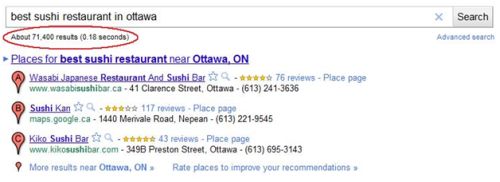In a previous blog post, we talked about how to conduct effective keyword analysis and touched on the importance of targeting the most relevant keywords for your business. In this edition of local search marketing, we will go over some of the key components a local business website can utilize to perform better in the search engines.

Attributes of Quality Keywords
Keyword research is like mining gold. It requires a lot of digging before you reach the pit, ultimately where your golden keyword lies. When go about qualifying your keywords, ask yourself these following questions:
How relevant are your keywords to your business? The more relevant your content is to your reader, the happier they are. Therefore, it is important to make sure your keywords are highly relevant to your product and/or service offerings. This helps search engines rank your pages better, driving more targeted traffic to your site.
Are your terms specifically targeting a subgroup of individuals? If you are a business that targets a sub region of the general population, it’s important to include geo-targeted terms in your keyword phrase. For example, if you’re a restaurant business located in Ottawa, you will want to target ‘ottawa restaurant’ and not just ‘restaurant’. Focusing on just ‘restaurant’ not only brings you unqualified traffic, but it wastes a lot of your time because that term is much more competitive.
Do your keyword phrases have a reasonable amount of traffic? It is good to know that the keywords you are targeting have a good amount of search traffic each month. You can use Google’s Traffic Estimator Tool to see how much traffic your keywords are receiving locally, per month.
Do you have competitors targeting the same keywords? Many businesses have done their homework already. Take notice as you are doing the keyword research that you target keywords that are somewhat competitive. A good indicator is if you look at whether you competitors are using Google Adwords. You can do so by seeing whether there are sponsored links in the results page. This signifies that the keyword has value to other companies.
What the Search Engine Results Page (SERP) Can Tell You
The search engine results page can tell you a lot about your competition. Start by taking a look how many competing pages there are in the search engines for your keyword phrases. For this example, if we are conducting keyword research for a sushi restaurant in the area (we’re from Ottawa), we would want to look at how competitive certain keywords are for that industry and location. Let’s compare what we got for “sushi restaurant”, “Ottawa sushi restaurant” and “best sushi restaurant in Ottawa”.

- “sushi restaurant” = 2,450,000 results
- “Ottawa sushi restaurant” = 161,000 results
- “best sushi restaurant in Ottawa” = 71,400 results (only three locations appear in the pack)
Based on these search results, we can see that the more descriptive the keyword phrase is, the lesser number of competing pages Google is able to retrieve. This is called long-tail keyword targeting. Long-tail keywords tend to be more specific, have fewer searches, but have much higher relevance to the searcher.
As behaviors change, we must change our traditional keyword research approach and include local search marketing tactics that are proving dominant to reach out to customers in the local space.
















